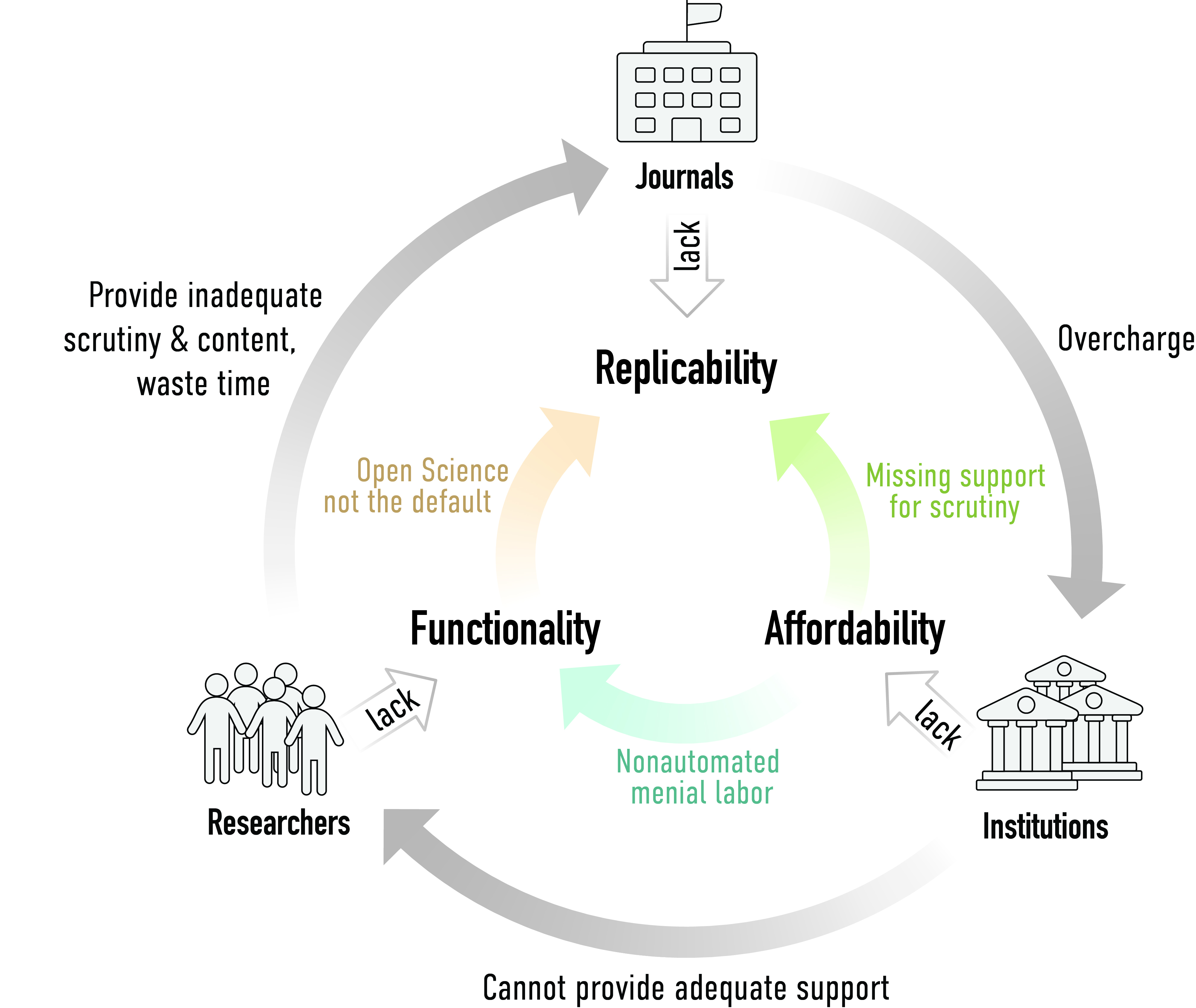Luckily, there are many roads to open access to publicly funded research. Currently, none of them are really sustainable by themselves, but in cooperation, they keep pushing for more open access and very successfully so. In a hypothetical forced choice situation, I’d probably favor immediate, non-embargoed ‘green’ deposition in institutional repositories over any of the other routes: it does not require anyone to abandon toll-access journals that still today make or break careers (absurd as this reality may be) and doesn’t require any additional funds out of the declining grant budget, only to mention two of several advantages.
However, essentially only physicists have developed any sort of deposition culture (in arxiv). For most other fields, ‘green’ deposition mandates are required to get the repositories filled to any reasonable level. It is precisely these mandates which are the Achilles’ heel of the green route: mandates are policies implemented by funders and most funders are government branches or at least heavily government-influenced. This means that it matters what politicians think about such mandates. If they become convinced that green mandates are irrelevant, or even a bad idea, they won’t be implemented. Obviously, publishers with their huge profits are in a much better position to buy access to politicians than us researchers who generate the literature in the first place. The willingness of publishers to use the profits derived from our work against us can be observed again and again: for instance by hiring Eric Dezenhall in the PRISM initiative to sway public opinion against open access. Or by paying two US lawmakers for drafting legislation that would make green mandates illegal: the research works act. The latest efforts can be seen in section 302 of the discussion draft of the Frontiers in Innovation, Research, Science and Technology Act of 2013 (FIRST) in the US. This section aims to enlarge green embargoes (the time before an article in a green repository becomes publicly accessible) to a whopping three years.
Thus, one more reason to develop an institutional infrastructure that covers our text, data and software needs is the independence from outside forces: if institutions decide to take care of their texts, data and software needs themselves (and save a few billions every year as a fringe benefit), there is nothing publishers or politicians can do to interfere with that process.














PRAGMATICS AND PRIORITIES
Yes, publishers lobby against Green OA mandates, and they have a lot of money.
But their lobbying just retards mandates — they are getting adopted anyway, and not just by funders but by universities and research institutes.
And the immediate-deposit mandate is immune to publisher embargoes.
The Achilles heel of OA (and not just Green OA) is researchers (other than physicists and computer scientists). They are afraid to deposit without mandates.
That’s why the mandates are needed.
[And the Achilles toe of OA is OA advocates who insist on the best right now (Fair Gold, CC-BY), without any practical way to get it: They too retard progress on the way to get it, which is to mandate Green OA (immediate institutional deposit, whether immediately OA or embargoed, whether Gold or Green, and whether Gratis (free online) or Libre (free online + re-use rights’.) Don’t fulminate: mandate. Mandates work.]
Yes, so far publishers were only able to retard mandates, yes, institutional mandates are a way around the political interference from publishers and yes, mandates are needed. I wasn’t arguing against mandates, I am arguing for expanding the institutional infrastructure beyond text to software and data and to improve their interoperability and functionality such that nobody will want to publish in legacy journals any more (as there is no evidence to justify their reputation anyway).
PRAGMATICS AND PRIORITIES II
It is of course desirable for institutions to “develop an institutional infrastructure that covers… text, data and software.”
in addition to having adopted a strong and effective Green OA mandate (Liege model: immediate-deposit, precondition research evaluation and funding, plus the Button).
But not instead.
(Once all of that is done, globally, I agree completely that the worldwide network of Green OA institutional repositories will become the access-providers and archivers, in place of the journals, which will downsize to just peer-review service provision — https://eprints.ecs.soton.ac.uk/13309/ & https://www.dlib.org/dlib/july10/harnad/07harnad.html — but, again, it is global Green OA that is the precondition for all that.)
No, of course not instead! I hope there is nothing in my post that makes it look like I propose an alternative – my vision is complementary!
PRAGMATICS AND PRIORITIES III
If we are agreed that the priority is effective Green OA mandates, and that the infrastructure you recommend is just complementary, then our only disagreement is about your suggestion that “subscription cancellations will provide more than enough funds to expand the infrastructure.”
Institutional subscription cancellations will only be possible when institutional users have an alternative way to access articles. That alternative way will be provided by Green OA.
But for that, effective mandates first have to be adopted, and the Green OA actually has to be provided, globally.
We are still far from that. So the funding for the complementary infrastructure you recommend is still out of reach — until we have grasped the Green OA that *is* within reach.
Yes, it seems we only disagree on the subscription cancellations. IMHO, these are necessary to fund the development of infrastructure that covers not only text, but data and software also. If we don’t do that, we have to ask politicians for these funds, while the money that ought to be spent on this task, keeps lining the pockets of publishers’ shareholders. I find this unacceptable: to ask the taxpayer for more money, while shareholders get rich on tax funds.
Not developing our infrastructure is not an option.
PS I think that once deposit in Institutional Green OA Repositories is universally mandated and the global network of Repositories is full of each institution’s peer-reviewed article output, the harvesting, search, navigation and data-mining of all that OA content will be a piece of cake, and will not require a lot of extra funding at all. What’s missing sorely today is neither infrastructure nor funding, but content.
Sorry, but there won’t be any data-mining at all if our repositories are lacking any data, but contain only text. That’s one of the main issues: while we’re trying to free text, all the other fruits of our labor go down the drain. We need this infrastructure now, or a decade from now, we wish we were in the comparatively happy state of scientific articles: inaccessible, but existing. Without this infrastructure a decade from now, much of the data and software from today will not exist any more. And that doesn’t even include the missed scientific discoveries, or the wasted time and effort of scientists.
By solving access at the exclusion of all other pressing issues, you may be helping taxpayers in the short run, at the expense of scientists. But by hurting science through inaction towards all the remaining major challenges, you will also hurt taxpayers in the long run: less science, less reliable science, and all the consequences this entails.
the reasons for not cancelling (affordable) institutional journal subscriptions while institutional users still need and lack access to their content stand on their own. No theorizing about future “infrastructure” needs alters them. And if that’s not enough, cancelling journals as their Green content increases is a terrific way to get them to adopt or increase Green embargoes.
Why would one cut a subscription for $1000 when one could cut a subscription for $10k? Clearly, the most money can had from the most expensive subscriptions. It would be silly to cancel the less expensive ones, why would one do that? I propose to cancel 30%, starting with the most expensive big deals.
I really don’t see a problem with canceling subscriptions when we have access to a large fraction of all articles anyway (perhaps not the newest ones, but in total the vast majority). As long as subscriptions are not cut according to accessibility, but according to ‘affordability’, what is the problem? Is 85% institutional access not enough for a transitional period? For me it would be enough, a small price indeed for 100% OA soon thereafter and support for all my needs.
Why would you not be willing to pay with 15% of your access for a few years, for full 100% sustainable OA to text, data and software afterwards, with many work-hours per week saved? What is so important about your final 15% of access that you’re not willing to part with it only for a transitional period?
——-
Sometimes, I dream of this scenario: we cancel all subscriptions world-wide at the same time to all journals and then use the funds to buy the publishers as they run out of money…
Haven’t you overlooked the cost of setting up and maintaining access to a massively fragmented repository system at every private and public institution receiving the benefits of public funding for research, around the world and with very little impetus for data archiving standards to boot?
I don’t think I have. For one, you are correct that today’s repository system is ‘massively fragmented’ and this needs to be remedied for any such infrastructure to be usable. That being said, there are roughly 10k institutions, but 30k journals. Thus, if the institutional repositories are ‘massively fragmented’ it’s still about one third as bad as the status quo. In other words, a migration from 30k journals down to 10k repositories with no other changes would already constitute an improvement, in my books.
In terms of software and data: the issue of standards is of course a major one, for all our ‘products’, literature as well. Also in this case, the status quo is already unacceptable, as no standards exist. hence, agreeing on standards is a cheap and simple way to improve the status quo beyond anything publishers are currently offering.
Finally, by making all current repositories interoperable and incorporating all back-issues where it is legally possible (isn’t there a university on the Cayman Islands?), institutions can cut 20-30% of their subscriptions without a major drop in access and use the billions saved annually to develop the remainder of the infrastructure.
In brief: what we have today is already better than what publishers offer at a fraction of the cost. With small improvements (standards allowing for interoperability and back-issue coverage), subscription cancellations will provide more than enough funds to expand the infrastructure to incorporate software and data as well, making publishers completely obsolete.